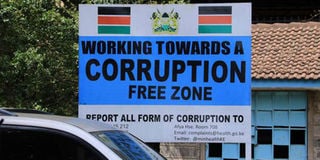Stop Afya House cabal’s regulatory mischief

A corruption message outside Ministry of Health building in Nairobi. PHOTO | FILE | NATION MEDIA GROUP
What you need to know:
- These individuals are proposing to remove medical practitioners from all statutory bodies on which they represent the profession and to replace them with practically anyone else the minister feels like appointing.
- Traditionally, doctors created and funded regulatory bodies to maintain the traditions and practices of the profession and to protect the public from charlatans.
There is a cabal at the Ministry of Health headquarters that is devilishly mischievous and wastes no opportunity to foment unrest in the health sector.
This cabal seeks every opportunity to muddy the waters and create mayhem for some as yet unknown reason. Perhaps these are the individuals the Cabinet secretary characterises as “cartels” who are reluctant to leave their posts even upon retirement or redeployment.
Recently, this group has authored proposed legislation to overhaul the composition of health sector regulatory authorities and the National Hospital Insurance Fund.
In their proposed amendments, they seek to remove health workers or their representatives from all regulatory boards, claiming that their presence constitutes ‘conflict of interest’.
These individuals are proposing to remove medical practitioners from all statutory bodies on which they represent the profession and to replace them with practically anyone else the minister feels like appointing.
In making these proposals, they display a poor grasp of the history of professional regulation and the modern realities in the sector. Traditionally, doctors created and funded regulatory bodies to maintain the traditions and practices of the profession and to protect the public from charlatans.
CODE OF ETHICS
Over time, these boards have been expanded to include lay members of the public, but their primary role has remained self-regulatory.
Whenever a practitioner runs afoul of the code of ethics, the board will summon them and put them on their defence. When they are found to pose a risk to the public, they are punished appropriately, including by removal from the professional register.
Practitioners submit to the authority of such boards because they are led by their peers and their decisions are informed not only by theoretical considerations, but also by the experience of the members of the boards.
No practitioner will submit to the authority of a board of laypersons that purports to prescribe the best way to practice a profession.
The mandarins at Afya House also ignore the very obvious fact that the ministry contributes nothing to the budgets of many of these boards. For instance, the current headquarters of the Kenya Medical Practitioners and Dentists Council was constructed with funds from individual practitioners and health facilities and the government did not contribute a single cent.
LICENSING FEES
All the running costs of the council are fully funded by registration and licensing fees collected from the regulated professionals and facilities. This is the case with most of the other regulators in the health sector.
It is, therefore, absurd for Afya House mandarins to want to interfere unnecessarily with these institutions.
Since it is clear that removing health workers from their own regulatory bodies is going to hobble these institutions, and that the professionals will vociferously oppose such an action, it then begs the question why anyone within the Ministry of Health hierarchy would think it is a good idea to make such proposals at this time when we are dealing with Covid-19.
Lukoye Atwoli is Associate Professor of Psychiatry at the Moi University School of Medicine [email protected]





